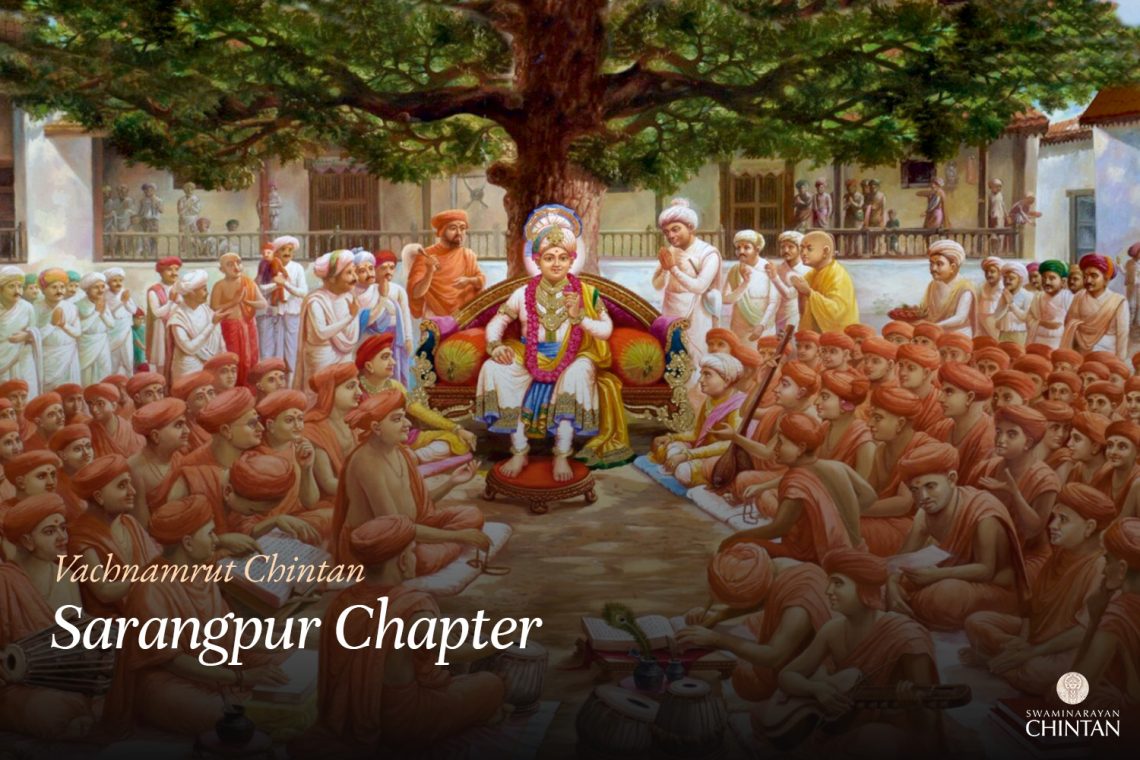Central Insights:
- Clear discernment between Atma (soul) and Anatma (non-soul).
Main Points:
- Develop a clear understanding that leads to becoming extremely Nirvasnik (free of worldly desires).
- Superficial understanding does not bring joy.
- Do not lose courage.
Commentary:
This Vachanamrut focuses on the clear identification of Atma and Anatma. Swayamprakashanand Swami asked a question: “Maharaj, how can we clearly understand the distinction between Atma and Anatma so that we do not confuse them as one?” Maharaj replied that whether it is understood through one Shlok (verse) or a thousand Shlokas, the understanding that brings clear knowledge is essential. After understanding this, there should be no confusion between the body and the Atma. Only a clear understanding is pleasant, while a superficial understanding is not. Until one internally identifies and decides who they truly are, the distinctions between the world and the body do not separate, and they cannot be suppressed. Hence, it is essential to have a clear identification (self-awareness) internally.
A person’s behavior and efforts change based on how they perceive themselves internally. For instance, if a person working in a shop starts their own business, their perspective changes completely. Initially, they worked as an employee, but now, considering themselves as the owner, their view on merchandise, customers, and pricing changes. This shift happens because their self-identification has changed from being an employee to an owner. Similarly, if one views themselves as the Atma, distinct and superior to the body, their actions and efforts transform accordingly.
Maharaj states that if one perceives themselves as distinctly different from the body and recognizes themselves as the Atma, their actions and efforts change accordingly. Although the Atma is indeed distinct from the body, we do not often examine this truth. Even if we see it, we do not internally accept ourselves as such because doing so would disrupt our mental arrangements and pleasures. Hence, we postpone accepting ourselves as Atma and continue all arrangements as per the body. Maharaj emphasizes that the Atma is vastly different from the body. Recognizing oneself firmly as distinct from the body and engaging in the contemplation of Purushottam Bhagwan’s form leads to strong discernment.
When faced with bodily feelings, if one is not resolute, they become identified with the body. Attributes such as family, caste, name, beauty, and physical features are all gross bodily attributes. The Atma does not possess these. Hunger, thirst, fatigue, anger, and similar feelings belong to the subtle body—prana (life force), antahkarana (inner faculty), and indriyas (senses)—but these are not my feelings. Inertia, attachment, and ignorance are all due to bodily attributes, but the Atma does not possess these. When this is clearly and firmly understood internally, it is considered clear discernment. If someone momentarily considers themselves distinct as Atma but later identifies with the body and contemplates women, they are foolish, and until this changes, they will not find happiness within.
Just as a large quantity of milk turns poisonous if a little poison is added, if one considers themselves distinct as Atma for an entire day but identifies with the body for a moment to enjoy sense objects, all their effort is in vain. After indulging, if they try to consider themselves as Atma again, the entire day’s effort is wasted. The joy of contemplating Atma does not arise; instead, the sorrow of bodily identification prevails. Therefore, one must develop a clear contemplation of Atma to become extremely Nirvasnik (free from all wordily desires).
Maharaj adds that there is no need to lose courage after hearing such a strict discourse, but rather, one should increase their efforts. Maharaj explains that if someone doubts whether they can become completely Nirvasnik and fears dying halfway, they should not be afraid. Only the body will die; the Atma will not. Keeping this in mind, one should strive to abandon desires. If, despite efforts, some desires remain, the devotee of God will not end up in Yamapuri (hell) or the cycle of 84 million births and deaths like a Vimukh (one who opposes God). Instead, if a devotee of God retains any worldly desires, they will attain the loka (realm) of deities like Indra, which is considered a kind of hell in Moksha Dharma compared to God’s abode. Ultimately, they will be reborn as humans, engage in devotion again, and finally attain Bhagwan’s Dham (God’s abode). Therefore, a devotee of God should not lose courage in the face of desires and should joyfully engage in devotion to God, continually striving to abandon desires and firmly trust in the words of God and His Santo.
Glossary
| Atma – Soul The true self, distinct from the physical body and mind. |
| Anatma – Non-Soul |
| Nirvasnik – Free of worldly desires |
| Purushottam Bhagwan – Supreme God |
| Prana – Life force |
| Antahkarana – Inner faculty |
| Indriyas – Senses The five sense organs (Eyes, Ears, Nose, Tongue, Skin) through which external knowledge is received. |
| Bodily Identification – Association with the body |
| Vimukh – One who turns away from God & His Devotees A person who distances themselves from devotion and Satsang. |
| Yamapuri – Hell |
| Loka – Realm |
| Moksh Dharma – Spiritual liberation |

